Medicine Safety Tips At Home
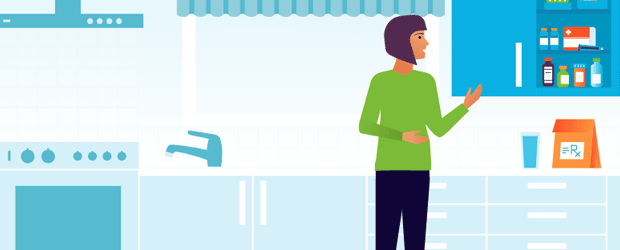
At home, Anna pays special attention on how to take and store her medicines.
Taking Your Medicine1
Here are some tips on taking medicines more safely in your home. Each time you take your medicines2-4:
- Notice the way the medicine looks including color, size, shape, markings and packaging
- Read the label to make sure you’re taking each medicine as prescribed.
- Check the expiration date of the medicine. Do not take it if it is expired
- Do not break, crush, or chew pills, unless your doctor tells you to. When you take liquid medicine, use the measuring device (spoon or cup) that comes with the medicine or ask for one at the pharmacy
- Do not take someone else’s medicines
If you experience side effects when taking a medicine, call your healthcare provider or pharmacist. Learn more about how to report side effects.
Taking Your Medicine at the Right Dose and the Right Time
It can be difficult to remember to take a medicine. Here are some useful reminders:4
- Use a pill organizer/pill box to organize the medicines you take regularly. You can buy one at the pharmacy
- Set reminders, like an alarm on your phone, or make a mark on your calendar, to keep track of the doses you take
- Link your medicine routine to something you do every day, like brushing your teeth
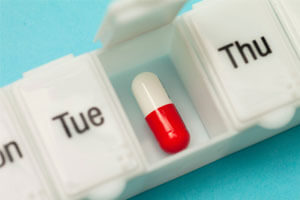
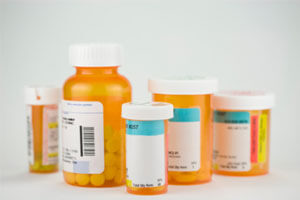
Storing Your Medicine5-8
- Keep medicines in their original containers and in a cool, dry place. Although people may think the bathroom cabinet is a good storage place, it is usually too hot and humid
- Follow any special storage instructions. Some medicines should be refrigerated
- Store medicines out of the reach and sight of children. If there are children in the home, use the child-resistant caps.
Disposing of Medicines Safely10-11
Most medicines may be thrown into household trash in the United States. For these medicines, it is recommended that patients:
- Mix medicines with a substance like used coffee grounds, dirt, or cat litter that makes it less appealing for children, pets, or anyone else to ingest. Then place in a sealed plastic bag BEFORE tossing in the trash
- Remove and destroy ALL identifying personal information from the medicine bottle
A few medicines should be flushed down the toilet. For more information, please visit the Food and Drug Administration (FDA) website below.
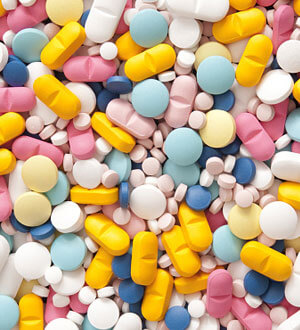
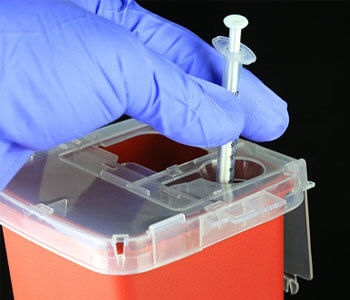
Disposing of Sharps Safely
Needles, syringes, injection devices, and lancets are considered as sharps and must be disposed of the right way. If they are not, they may cause harm or spread disease.
Used sharps must be handled carefully. They should be placed immediately in a sharps disposal container and thrown out separately from household trash.
Visit the Coalition for Safe Community Needle Disposal site to find more information on where to safely dispose of sharps in the United States.
View our Frequently Asked Questions.
View our Sharps Disposal Plan.
1 Food and Drug Administration. Avoid Food Drug Interactions. https://www.fda.gov/consumers/consumer-updates/avoiding-drug-interactions
2 Food and Drug Administration. Stop—Learn—Go—Tips for Talking with Your Pharmacist to Learn How to Use Medicines Safely. https://www.fda.gov/Drugs/ResourcesForYou/ucm163330.htm Published August 30, 2013.
3 Food and Drug Administration. 6 Tips to Avoid Medication Mistakes. https://www.fda.gov/ForConsumers/ConsumerUpdates/ucm096403.htm Published April 2, 2018.
4 National Institute on Aging. Safe Use of Medicines for Older Adults. https://www.nia.nih.gov/health/safe-use-medicines-older-adults Published May 23, 2017.
5 Food and Drug Administration. Lock it Up: Medicine Safety in Your Home. https://www.fda.gov/ForConsumers/ConsumerUpdates/ucm272905.htm Published March 27, 2018.
6 Agency for Healthcare Research and Quality. Your Medicine: Be Smart. Be Safe. https://www.ahrq.gov/patients-consumers/patient-involvement/ask-your-doctor/tips-and-tools/yourmeds.html Published August 2017.
7 Institute for Safe Medication Practices. Where Do You Keep Your Medicine? http://www.consumermedsafety.org/medication-safety-articles/item/341-where-do-you-keep-your-medicine Published July 1, 2008.
8 Centers for Disease Control and Prevention. Put Your Medicines Up and Away ad out of Sight. https://www.cdc.gov/Features/MedicationStorage/ Published June 13, 2016.
9 Food and Drug Administration. Disposal of Unused Medicines: What You Should Know. https://www.fda.gov/Drugs/ResourcesForYou/Consumers/BuyingUsingMedicineSafely/EnsuringSafeUseofMedicine/SafeDisposalofMedicines/ucm186187.htm Published May 25, 2018.
10 Food and Drug Administration. Safely Using Sharps (Needles and Syringes) at Home, at Work and on Travel. https://www.fda.gov/MedicalDevices/ProductsandMedicalProcedures/HomeHealthandConsumer/ConsumerProducts/Sharps/default.htm Published March 26, 2018.
11 Food and Drug Administration. Best Way to Get Rid of Used Needles and Other Sharps. https://www.fda.gov/MedicalDevices/ProductsandMedicalProcedures/HomeHealthandConsumer/ConsumerProducts/Sharps/ucm263240.htm Published January 24, 2018.